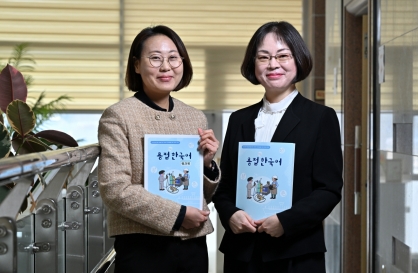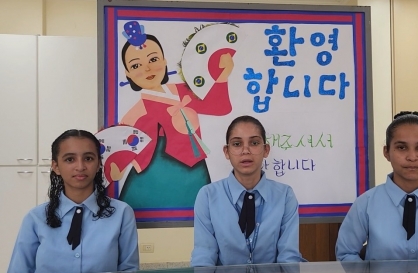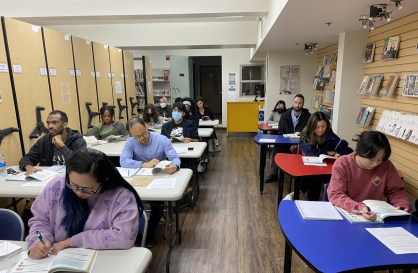Most Popular
Hello Hangeul
-
1
Welding book first in vocational Korean series for foreign labor

-
2
[Korea Beyond Korea] In Sao Paulo, horizons expand for Korean studies
![[Korea Beyond Korea] In Sao Paulo, horizons expand for Korean studies](//res.heraldm.com/phpwas/restmb_idxmake.php?idx=644&simg=/content/image/2023/11/20/20231120000619_0.jpg&u=20231206104853)
-
3
In Brasilia, worldly dreams are born from Korean classes

-
4
Americans seeking to visit Korea learn the language in LA

-
5
[Korea Beyond Korea] Berlin, Europe's Korean Studies hub, nurtures next-gen experts, scholars
![[Korea Beyond Korea] Berlin, Europe's Korean Studies hub, nurtures next-gen experts, scholars](//res.heraldm.com/phpwas/restmb_idxmake.php?idx=644&simg=/content/image/2023/10/18/20231018000929_0.jpg&u=20231023154735)
[Hello Hangeul] Edu-tech firm Visang rides Korean learning wave
Advanced digital content, AI-assisted learning have the potential to supplement Korean teaching shortage across globe, says head of Visang Education's overseas Korean education unit
By Choi Jae-heePublished : June 20, 2023 - 08:54

The global Korean language boom has passed the point where Korean government-dispatched teachers and state-run language promotion agencies can meet local teaching demands.
It is now time for Korea’s edu-tech players, trained to serve a particularly discerning and demanding clientele at home, to play a role, said Visang Education’s global education unit chief.
“Demand for Korean language learning has exploded in many countries amid the worldwide popularity of Korean content. Our goal is to connect Korean language institutes here and abroad with learners, wherever they are, with technology tools,” said Noh Joong-il, head of Visang Education’s executive in charge of its overseas business unit, Global Education Organizer Core Group.
GEO Core Group was established in 2019 as part of the Korean education giant’s global strategies, with a specific emphasis on Korean language education.
With its “Master K” brand, the firm offers e-learning solutions for Korean educators and learners, encompassing virtual classes, digital and interactive education content and AI-based speech training services.
Vietnam, where Korean language learning has boomed in recent years, was its first target market. It set up a subsidiary in Hanoi in 2020.
Now, a total of 14 universities across the Southeast Asian country, including Dalat University in Dalat, Lam Dong province, and Phenikaa University in Hanoi, offer their Korean language majors access to “klass,” a sub-brand of Master K for virtual class and interactive online learning.

Noh said in Vietnam many local educational facilities, from secondary schools to universities, lack certified instructors who can teach Korean language classes.
While more than 20,000 undergraduates major in Korean language across 53 Vietnamese universities with the Korean department, there are only 300 Vietnamese instructors of Korean language, according to the faculty of Korean language and culture at the University of Languages and International Studies under Vietnam National University.
The Korean government has played an important role in supporting Korean studies overseas, but there is a limit to the number of teachers and language programs they can provide to meet rising global demand for Korean studies, Noh said.
“Edu-tech can fill the gap,” he stressed. “Imagine one teacher offering a lesson at more than five locations across Vietnam simultaneously via a remote learning platform.”
With Master K content and services prepared in major world languages, including English, Spanish, Chinese and Japanese, the executive said the company now looks to expand its presence in other countries.
Foreign education authorities are showing interest in Visang’s edu-tech offerings, he said.
In February this year, a group of 10 education officials visited the firm’s headquarters in Seoul’s Guro-gu.

“The COVID-19 outbreak ushered in a new era of hybrid learning, a combination of online and offline learning activities. This is the future of education. I think Visang Education’s digital learning platform could make quality education more accessible and affordable to many students in less privileged countries,” said Dr. Ethel Agnes Pascua-Valenzuela, director of the Southeast Asian Ministers of Education Organization during the visit.
Noh stressed that private edu-tech experts can contribute to making Korean a fun, intriguing and more attractive subject to learn.
The private sector would complement the traditional, state-led effort to proliferate language -- namely the provision of teachers and textbooks -- with its innovative solutions and diverse content, which would help sustain and maintain the interest of learners, the executive said.
“Innovative learning platforms with fun and intriguing content are crucial in ensuring that learners remain captivated through their Korean learning journey,” he said.





![[Herald Interview] How Gopizza got big in India](http://res.heraldm.com/phpwas/restmb_idxmake.php?idx=644&simg=/content/image/2024/11/20/20241120050057_0.jpg&u=20241120164556)


![[KH Explains] Dissecting Hyundai Motor's lobbying in US](http://res.heraldm.com/phpwas/restmb_idxmake.php?idx=644&simg=/content/image/2024/11/20/20241120050034_0.jpg&u=)
![[Kim Seong-kon] Farewell to the vanishing John Wayne era](http://res.heraldm.com/phpwas/restmb_idxmake.php?idx=644&simg=/content/image/2024/11/19/20241119050096_0.jpg&u=)
![[Graphic News] 70% of S. Koreans believe couples can live together without tying the knot: survey](http://res.heraldm.com/phpwas/restmb_idxmake.php?idx=644&simg=/content/image/2024/11/19/20241119050098_0.gif&u=)

![[Korea Beyond Korea] In Sao Paulo, horizons expand for Korean studies](http://res.heraldm.com/phpwas/restmb_idxmake.php?idx=644&simg=/content/image/2023/11/20/20231120000619_0.jpg&u=20231206104853)


![[Korea Beyond Korea] Berlin, Europe's Korean Studies hub, nurtures next-gen experts, scholars](http://res.heraldm.com/phpwas/restmb_idxmake.php?idx=644&simg=/content/image/2023/10/18/20231018000929_0.jpg&u=20231023154735)







![[Today’s K-pop] Blackpink’s Jennie, Lisa invited to Coachella as solo acts](http://res.heraldm.com/phpwas/restmb_idxmake.php?idx=642&simg=/content/image/2024/11/21/20241121050099_0.jpg&u=20241121172748)